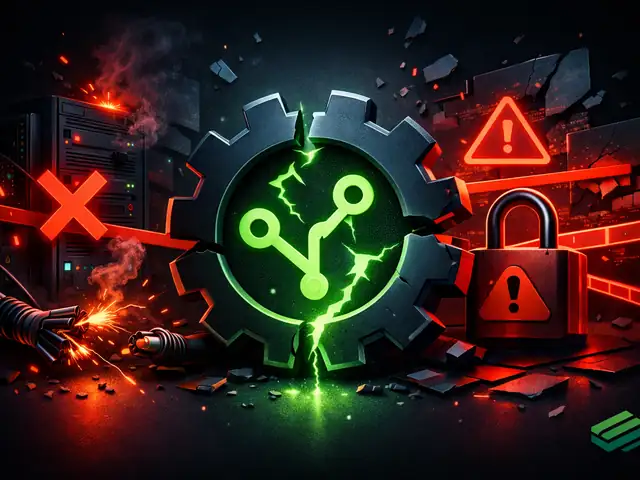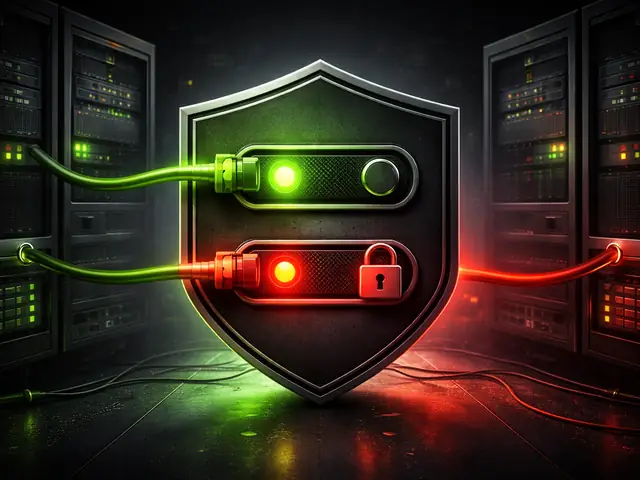
GitOps is an approach to managing infrastructure and Kubernetes through Git as a single source of truth. It simplifies deployment, reduces risks, eliminates con...
3v-Hosting Blog
15 min read
The number of websites on the internet is constantly growing, because today not only large companies can afford their own website, but also private specialists, developers, bloggers, or authors of small projects. However, along with the growth in the number of websites on the network, the number of cyber threats aimed at hacking, infecting, or completely disabling them is also increasing. The reasons and motives for these actions may vary, but they are not of interest to us in the context of this article. What is important is how to protect yourself from them.
Website protection directly affects user trust, data security, and project stability. At the same time, there is a widespread belief that reliable security necessarily requires serious financial investment. But in practice, this is not always the case, and in this article, we will look at cost-effective strategies that can significantly improve the security of your website without significant financial investment.
Most successful attacks occur not because of a lack of expensive solutions to protect the website or project, but because of basic mistakes made by administrators or programmers. Among the most common reasons are, for example, the use of weak passwords, outdated software, lack of traffic filtering or backups, etc. Addressing these specific issues provides maximum effect with minimal investment.
But it is not enough to solve one problem and rest on your laurels. No, in the field of security, a competent approach is not to buy one “magic” tool, but to combine the right hosting, basic technical measures, and regular monitoring of the site's status.
Before implementing protective mechanisms, you need to understand what threats websites most often face and what real danger they pose to your project. Without this, any security measures turn into a chaotic set of tools that may be either excessive or, conversely, fail to cover critical vulnerabilities.
Most attacks on the Internet are not targeted, and most often websites are subjected to automated scanning, in which bots search for vulnerable CMS versions, plugins with known security issues, open admin panels, or weak passwords. Such attacks are completely independent of the size or popularity of the website, and both large portals and small personal blogs can be targeted.
Understanding the nature of cyber threats allows you to:
That is why, before configuring firewalls, authentication, and other protective mechanisms, it is worth understanding which types of attacks are most common, how they work, and what consequences they can have for the website, user data, and the reputation of the entire project.
In practice, the main dangers are:
To simplify the prioritization of protective measures, it is useful to consider threats in conjunction with the minimum countermeasures:
| Threat | What is at risk | Minimal protection |
|---|---|---|
| Malware | Website files, user data | Updates, access permissions, antivirus |
| DDoS | Website availability | WAF, rate limiting, hosting-level protection |
| SQL injection | Database | CMS updates, WAF, input validation |
| XSS | Website users | Input filtering, updates |
This approach allows you to avoid spreading your resources too thin and focus on truly critical areas.
Now that we “know the enemy,” we can move directly to countermeasures against specific attacks, or more precisely, to measures that will collectively nullify attempts to attack your website.
Hosting is the foundation of any website. It is at the infrastructure level that a significant part of the protection is laid, and mistakes at this stage will be difficult to compensate for in the future.
The key aspects of secure hosting are:
Before purchasing hosting, make sure that:
By choosing the right hosting and configuring it according to these recommendations, you are already well on your way to a secure website. As a nice bonus, readers of our blog can get a VPS server with a 20% discount using the promo code 3vBlogReader.
Now that we've figured out hosting and chosen a reliable infrastructure, we can move on to software and application-level security.
One of the most affordable and effective ways to improve the security of your site is to simply strengthen authentication.
First of all, it is worth implementing multi-factor authentication (MFA) for administrative accounts. Even if the password of one of the administrators is compromised, the additional factor will make it much more difficult to hack their account.
Password policies should not be neglected either. Using complex, unique passwords and strictly prohibiting the reuse of the same credentials for different services significantly reduces the risk of unauthorized access.
It is also always necessary to use HTTPS with an SSL certificate, as connection encryption protects authorization data from interception and is a mandatory standard for modern websites. Moreover, Google penalizes websites that do not use HTTPS, which can have an extremely negative impact on the SEO of your website or project.
Even without using or purchasing complex solutions, you can take three simple steps that will significantly improve the security of your website. These steps are:
These measures require virtually no financial investment (SSL certificates are inexpensive), but significantly increase the overall level of security.
Outdated software is one of the most common reasons for website hacks. Various CMS, plugins, and server components receive regular security updates, but ignoring them and neglecting timely updates poses a direct threat to website security. Therefore, it is always recommended to:
Often, website owners either postpone updates “until better times,” use plugins that have long been unsupported, or try to update the system without having backups. As a result, an unexpected failure can bring down the entire project. Therefore, to avoid such problems, it is worth sticking to a simple rule: first make a backup, then update.
A WAF (Web Application Firewall) acts as a kind of intermediate filter between your website and the internet, blocking malicious requests before they even reach the application itself.
There are two main approaches:
| WAF type | Advantages | Disadvantages |
|---|---|---|
| Cloud WAF | Fast deployment, DDoS protection | Dependency on the provider |
| Server-side WAF | Full control, free to use | Requires system administration skills |
For VPS owners with basic Linux knowledge, iptables or nftables are an excellent solution, allowing you to configure traffic filtering at no additional cost. These tools are well-established, highly flexible, and incredibly powerful in terms of their functionality. Every self-respecting system administrator should be familiar with these tools.
DDoS (Distributed Denial of Service) is a type of attack in which a website or server is “flooded” with a large number of requests from multiple sources. The goal is usually not to hack the site, but to make it inaccessible when pages stop opening, the control panel does not respond, services go down, and users leave.
It is important to understand that DDoS is not a single type of attack, but a whole family of scenarios. In practice, it is useful for website owners to divide them according to what they primarily target:
DDoS attacks are often confused with simply high traffic or certain problems on the server side. But in practice, the following symptoms should alarm you:
1) Start with protection on the hosting side
If the attack is at the channel level, the provider and its traffic filtering capabilities play a key role. In practice, this is the most economical way. Therefore, it is better to choose a hosting provider that has basic anti-DDoS measures and experience in responding to such incidents. Even simple filtering of “junk” traffic on the network side can save your site without additional costs.
2) Use WAF or CDN with filtering (if possible on a budget)
Even inexpensive cloud solutions can filter out some L7 attacks and bots, reduce the load on the server, and stabilize the site during an attack. It is important not to “buy everything in a row,” but to enable basic policies such as blocking obvious bots, filtering suspicious patterns, and limiting requests.
3) Limit the frequency of requests to the most “expensive” points of the site
Most L7 attacks do not target the main page, but rather resource-intensive areas such as login, search, shopping cart, API, or dynamic pages. Even simple rate limiting at the web server level can dramatically improve the situation because it cuts off repetitive requests and “cheaps” traffic processing.
4) Reduce the cost of processing requests
If a website crashes due to an HTTP flood, it is often not the number of requests itself that is the problem, but the fact that each request “pulls” the database and heavy logic. In this case, the following measures can help:
In order not to react to an incident in a panic and make mistakes, it is useful to prepare in advance:
DDoS is dangerous not so much because the site is down, but because in many cases the attack is used only as a backdrop, because while the owner is trying to restore availability, attackers are trying to guess passwords, look for vulnerabilities, or attack administrative panels. Therefore, it is advisable to supplement measures against DDoS with strict authentication, updates, and WAF, as described above. Only by taking all of the measures described above can you significantly increase the stability of your project.
Even if you follow all of the recommendations described above, it is important to regularly check the security status of your website.
Automatic scanners can detect common vulnerabilities, such as SQL injections and XSS, before attackers get to you. Manual code and configuration checks are also useful, especially after making changes or updates.
For commercial projects, it makes sense to periodically conduct penetration testing, simulating real attack scenarios and identifying weaknesses in your infrastructure.
Yes, in most cases, basic security measures cover the majority of typical threats. Regular updates, reliable hosting, complex passwords, backups, and minimal traffic filtering can effectively protect a website without the use of paid enterprise solutions.
No, antivirus software is only an auxiliary tool. Real security is built on a combination of factors: secure infrastructure, correct server settings, up-to-date software, and access control. Without these elements, antivirus software will not be able to prevent most attacks.
Yes, even for small websites, WAF is useful because it blocks automated attacks, vulnerability scans, and suspicious requests. Minimal filtering significantly reduces the risk of website compromise without significantly impacting performance.
It is recommended to perform backups daily, especially if the website is regularly updated or contains user data. With active changes or online stores, backups may be required even more frequently to minimize potential losses.
For most websites, a CMS hack is more critical, as it can lead to data leaks, malware infection, and loss of user trust. DDoS attacks are often temporary, while the consequences of a hack can last for a long time.
Yes, automated attacks do not choose their targets based on popularity. Bots scan the internet for vulnerable websites regardless of their size, so even a small project without protection can be compromised.
Automation greatly simplifies security maintenance, but it cannot completely replace administrator control. The optimal approach is a combination of automatic updates, backups, and periodic manual checks.
Protecting a website from cyber threats does not have to be expensive or overly complicated. In most cases, reliable security is built not on the use of expensive services, but on a systematic approach and attention to the basics. Understanding the most common types of attacks allows you to identify real risks in advance and avoid wasting resources on unlikely scenarios.
Choosing the right hosting provider lays the foundation for security at the infrastructure level, while strong authentication and connection encryption protect access to the site and user data. Regular software updates eliminate known vulnerabilities before attackers can exploit them, and the use of WAF and basic traffic filtering helps block automated attacks before they even reach the application.
Backups and regular security checks play an equally important role. Not only do they allow you to quickly restore the site in the event of an incident, but they also give you confidence that even if a problem arises, the damage will be minimal and controllable. This approach is especially important for projects that are actively developing and working with user data.
Investing in security is not only an investment in protection against hacking, but also in the stability of the site, the reputation of the project, and user trust. The sooner security issues become part of everyday site support, the lower the costs and risks will be in the future.

Switching users in Ubuntu: su, sudo, sudo -i, sudo -u, and SSH. A practical guide to working securely with permissions, environments, and sessions on servers an...

Managing ports on VPS and dedicated servers: how to check open ports, configure your firewall correctly, avoid common mistakes, and improve infrastructure secur...

Optimizing Windows Server 2022 on a VPS with 2-4 GB of RAM: how the system uses memory, what can be safely configured, pagefile, services, GUI, and when upgradi...